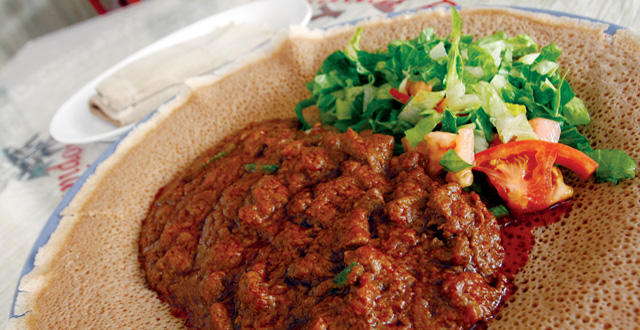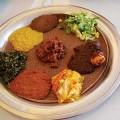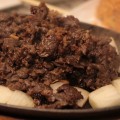San Jose boasts a half-dozen Ethiopian restaurants, and humble Mudai is one of my favorites. Mudai Ethiopian Restaurant doesn’t feel so much like a restaurant as it does an Ethiopian cultural center or an extended living room
There is a space off the main dining room with a couch and comfortable chairs and what looks like a spot for live music. The rest of the restaurant is done up with Ethiopian knickknacks and tourist-board posters and a bar stocked with Ethiopian wine, which always has a few people at the counter lingering over cups of good Ethiopian coffee.
Of course, what makes Mudai most inviting is the food. Peering into the kitchen, I saw a couple of women with elaborate hair wraps stirring pots and chopping vegetables, in no particular hurry. The spicy, rich smell of niter kebbeh (spice-infused clarified butter) hung in the air like perfume.
The star of the kitchen is the doro wat ($12). Doro wat is commonly referred to as Ethiopia’s national dish—as well it should be. The saucy chicken is superb, and Mudai’s version is the best I’ve had in Silicon Valley. On paper, the description is inviting but doesn’t do the dish justice: “Zesty homemade and traditional chicken in a very red hot and spicy gravy.”
What makes Mudai’s take on doro wat different is the thick sauce, which resembles a Mexican mole. Wat means stew (doro means, you guessed it, chicken), and what thickens the piquant dish is onions that are cooked in a dry skillet to dehydrate and concentrate them. Butter or oil (or sometimes both) is blended in along with tomatoes and the bewitching Ethiopian curry berbere, a blend that typically includes cayenne pepper, ginger, clove, fenugreek, cardamom, cinnamon, allspice and other things from the spice cabinet.
In the hands of Mudai’s cooks the result is a silken, wonderfully complex and aromatic sauce that blankets and penetrates the chicken. Because you eat with spongy injera bread instead of utensils at Ethiopian restaurants, you’ll end up with the haunting aroma of the sauce on your fingertips long after you’ve left. Consider it a parting gift.
Kifto ($12.20), Ethiopia’s take on steak tartare, is another must-order. This dish of raw ground beef (it’s available cooked if you’re a boring, conservative eater) is a great showcase for niter kebbeh. The spiced butter elevates the already rich beef another notch. It’s served in a great pile atop injera, so be sure to share this one. No one should eat this much raw meat alone.
As well as Mudai does its chicken and beef, the vegetarian dishes shine, too. Foul ($7.50, pronounced “fool”) combines fava beans simmered in more of that delicious spiced butter with onions, tomatoes and jalapeños.
Gomen ($9.75), chopped collard greens sautéed with garlic, onions and green peppers, is another winner. Ater kik ($9.10), spicy garbanzos beans, is a sloppy dish to eat, but the flavor is worth a stain on your shirt. After all, this is a homey, casual place where no one will begrudge you digging in and getting a little messy.

 Wine Weekend in Santa Cruz
Wine Weekend in Santa Cruz  Michelin Guide 2010 is Here
Michelin Guide 2010 is Here 


